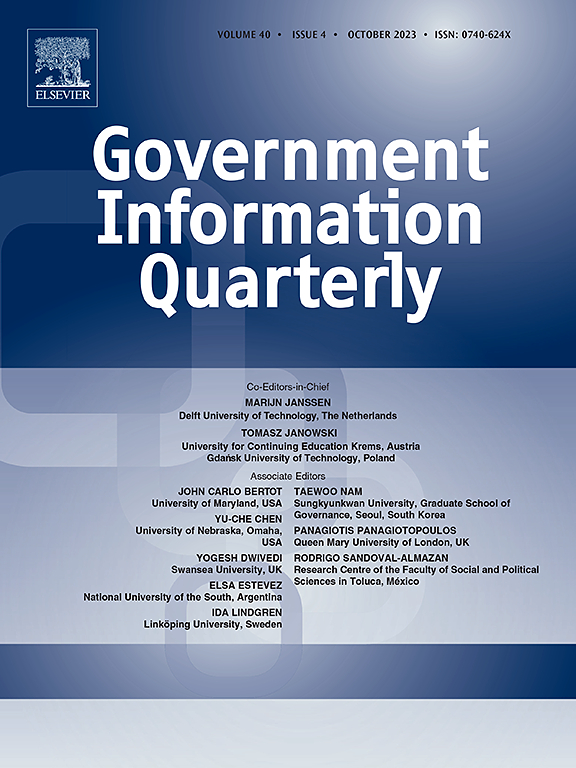The trust trifecta: How transparency, ethics, and benefits shape public confidence in government AI
IF 10
1区 管理学
Q1 INFORMATION SCIENCE & LIBRARY SCIENCE
引用次数: 0
Abstract
As governments increasingly adopt artificial intelligence (AI) in public administration, public trust is critical for successful implementation. Using an adapted Technology Acceptance Model (TAM), this study examines how perceived transparency, ethical principles, and perceived benefits of government AI adoption affect public trust. This study is especially applicable in the domain of China's rapid digital transformation and the government's push for AI-driven smart city initiatives, where unique cultural values and governance structures shape public perceptions differently from Western contexts. Data from 608 Chinese citizens were collected through a questionnaire survey to measure perceived AI transparency, ethical principles, perceived benefits, and public trust in government AI use. This research applied structural equation modeling (SEM) to explore the proposed relationships and mediating effects. The findings indicate that both perceived transparency and ethical principles positively affect the perceived benefits of AI technology, which significantly increases public trust in government AI use. Transparency and ethics also directly affect public trust. Notably, perceived benefits mediated the relationship between transparency, ethics, and public trust, suggesting that transparency and ethics indirectly affect trust by influencing perceived benefits. This study validates the extended TAM in the context of government AI applications and shows that improving transparency and ethical compliance in AI use can increase perceived gains and thus public trust in government AI technologies. These insights provide valuable guidance for policymakers to optimize AI application strategies and improve public acceptance, especially in the Chinese context where balancing technological advances with public concerns is becoming increasingly important.
信任三重奏:透明度、道德和利益如何塑造公众对政府人工智能的信心
随着政府越来越多地在公共管理中采用人工智能(AI),公众信任对成功实施至关重要。本研究采用技术接受模型(TAM),考察了政府采用人工智能的感知透明度、道德原则和感知效益如何影响公众信任。这项研究特别适用于中国快速数字化转型和政府推动人工智能驱动的智慧城市倡议领域,在这些领域,独特的文化价值观和治理结构塑造了与西方背景不同的公众观念。通过问卷调查收集了608名中国公民的数据,以衡量感知的人工智能透明度、道德原则、感知的利益以及公众对政府使用人工智能的信任。本研究运用结构方程模型(SEM)来探讨二者之间的关系和中介效应。研究结果表明,感知到的透明度和道德原则都对人工智能技术的感知效益产生了积极影响,这显著增加了公众对政府使用人工智能的信任。透明度和道德也直接影响公众的信任。值得注意的是,感知利益在透明度、道德和公众信任之间起中介作用,表明透明度和道德通过影响感知利益间接影响信任。本研究在政府人工智能应用的背景下验证了扩展的TAM,并表明提高人工智能使用的透明度和道德合规性可以增加感知收益,从而增加公众对政府人工智能技术的信任。这些见解为政策制定者优化人工智能应用策略和提高公众接受度提供了有价值的指导,特别是在平衡技术进步与公众关注变得越来越重要的中国背景下。
本文章由计算机程序翻译,如有差异,请以英文原文为准。
求助全文
约1分钟内获得全文
求助全文
来源期刊

Government Information Quarterly
INFORMATION SCIENCE & LIBRARY SCIENCE-
CiteScore
15.70
自引率
16.70%
发文量
106
期刊介绍:
Government Information Quarterly (GIQ) delves into the convergence of policy, information technology, government, and the public. It explores the impact of policies on government information flows, the role of technology in innovative government services, and the dynamic between citizens and governing bodies in the digital age. GIQ serves as a premier journal, disseminating high-quality research and insights that bridge the realms of policy, information technology, government, and public engagement.
 求助内容:
求助内容: 应助结果提醒方式:
应助结果提醒方式:


